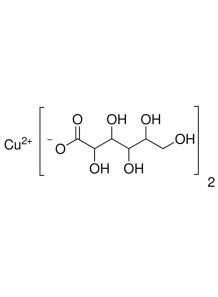Copper Gluconate (14% Copper)
- Product Code: 8886
form of copper used as a dietary supplement to address copper deficiency and to provide various health benefits
- -
- -
- -
- -
- -
- -
- -
- -
- -
- -
- -
- -
- -
- -
- -
- -
- -
- -
| Test Name | Specification |
|---|---|
| Appearance | Blue-green powder |
| Content (on dry basis) | 98.0-102.0% |
| Chloride | 0.07% Max |
| Sulfate | 0.05% Max |
| Arsenic | 3ppm Max |
| Lead | 20ppm Max |
| Reducing Subtances | 1% Max |
| Aerobic Plate Count | 1000 cfu/g Max |
| Yeast and Mold Count | 100 cfu/g Max |
| Total Coliforms | Negative |
Copper gluconate is a form of copper used as a dietary supplement to address copper deficiency and to provide various health benefits. Here are some of the health benefits of copper gluconate:
-
Antioxidant Properties: Copper is a cofactor for superoxide dismutase (SOD), an enzyme that helps protect cells from damage caused by free radicals. This can help reduce oxidative stress and prevent cell damage.
-
Immune System Support: Copper plays a crucial role in maintaining a healthy immune system. It helps in the production and function of white blood cells, which are essential for fighting infections.
-
Cardiovascular Health: Copper is necessary for the formation of red blood cells and maintaining healthy blood vessels, nerves, and immune function. It aids in the production of hemoglobin and helps in the maintenance of cardiovascular health.
-
Bone Health: Copper is involved in the formation of collagen, a key component of connective tissues, including bones and cartilage. This can help support bone strength and integrity.
-
Nervous System Function: Copper is essential for the proper functioning of the nervous system. It aids in the production of neurotransmitters, which are necessary for nerve signal transmission.
-
Iron Metabolism: Copper helps in the absorption and utilization of iron, which is crucial for the formation of red blood cells and preventing anemia.
-
Skin and Hair Health: Copper is involved in the production of melanin, the pigment that gives skin and hair their color. It also supports the formation of collagen and elastin, contributing to skin elasticity and wound healing.
-
Energy Production: Copper is a component of several enzymes that are involved in energy production at the cellular level. It helps in the conversion of food into energy.
-
Anti-Inflammatory Effects: Copper has anti-inflammatory properties that can help reduce symptoms of arthritis and other inflammatory conditions.
-
Support for Enzymatic Reactions: Copper is a cofactor for many enzymes involved in vital biochemical reactions in the body, including those related to neurotransmitter synthesis, connective tissue formation, and iron metabolism.
Be the first to review this product :-)
Recommend Lab-Service
| Lab Service | Price |
|---|

form of copper used as a dietary supplement to address copper deficiency and to provide various health benefits
Copper gluconate is a form of copper used as a dietary supplement to address copper deficiency and to provide various health benefits. Here are some of the health benefits of copper gluconate:
-
Antioxidant Properties: Copper is a cofactor for superoxide dismutase (SOD), an enzyme that helps protect cells from damage caused by free radicals. This can help reduce oxidative stress and prevent cell damage.
-
Immune System Support: Copper plays a crucial role in maintaining a healthy immune system. It helps in the production and function of white blood cells, which are essential for fighting infections.
-
Cardiovascular Health: Copper is necessary for the formation of red blood cells and maintaining healthy blood vessels, nerves, and immune function. It aids in the production of hemoglobin and helps in the maintenance of cardiovascular health.
-
Bone Health: Copper is involved in the formation of collagen, a key component of connective tissues, including bones and cartilage. This can help support bone strength and integrity.
-
Nervous System Function: Copper is essential for the proper functioning of the nervous system. It aids in the production of neurotransmitters, which are necessary for nerve signal transmission.
-
Iron Metabolism: Copper helps in the absorption and utilization of iron, which is crucial for the formation of red blood cells and preventing anemia.
-
Skin and Hair Health: Copper is involved in the production of melanin, the pigment that gives skin and hair their color. It also supports the formation of collagen and elastin, contributing to skin elasticity and wound healing.
-
Energy Production: Copper is a component of several enzymes that are involved in energy production at the cellular level. It helps in the conversion of food into energy.
-
Anti-Inflammatory Effects: Copper has anti-inflammatory properties that can help reduce symptoms of arthritis and other inflammatory conditions.
-
Support for Enzymatic Reactions: Copper is a cofactor for many enzymes involved in vital biochemical reactions in the body, including those related to neurotransmitter synthesis, connective tissue formation, and iron metabolism.
| Mechanism | - |
| Appearance | - |
| Longevity | - |
| Strength | - |
| Storage | - |
| Shelf Life | - |
| Allergen(s) | - |
| Dosage (Range) | - |
| Recommended Dosage | - |
| Dosage (Per Day) | - |
| Recommended Dosage (Per Day) | - |
| Mix Method | - |
| Heat Resistance | - |
| Stable in pH range | - |
| Solubility | - |
| Product Types | - |
| INCI | - |
Cart
No products



